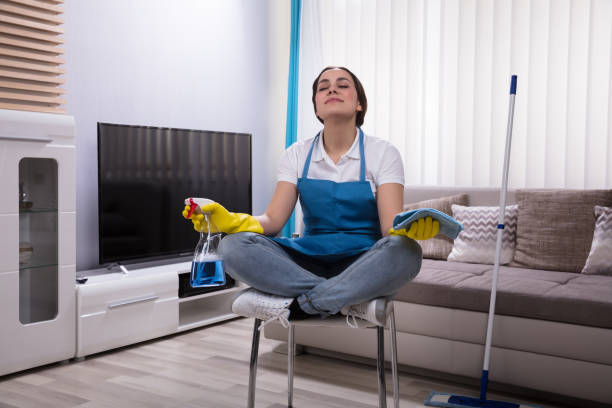In the modern world, where stress and anxiety are constant companions, the idea of a clean, organized home may seem like a minor factor.
However, the cleanliness of our living space plays a significant role in shaping our mental well-being. Research from the Journal of Environmental Psychology confirms that maintaining a tidy home can enhance mental clarity, reduce stress, and foster a positive outlook on life.
Beyond the aesthetics, a clean home serves as a sanctuary, offering peace and mental rejuvenation. If you’ve ever experienced the subtle yet profound relief of walking into a well-organized room, you’ve already felt the mental health benefits of cleanliness at work.
Let’s explore seven ways a clean home contributes to better mental health and why prioritizing cleanliness should be considered self-care, not a chore.
1. Less Stress and More Emotional Balance
A cluttered space often reflects a cluttered mind. Living in a disorganized environment can create feelings of unease, as the brain is constantly reminded of incomplete tasks. This sensation can trigger a fight-or-flight response, releasing cortisol — the stress hormone — into your system. Over time, this can leave you feeling anxious, irritable, and overwhelmed.

On the other hand, a clean home signals to your brain that things are under control. When everything has its place, you regain a sense of authority over your environment, reducing cortisol production. Cleaning can also be therapeutic, offering an outlet for physical activity and giving you a sense of accomplishment. This is especially helpful for people dealing with anxiety or depressive episodes, as small, manageable tasks can reintroduce a sense of purpose.
Pro Tip: If cleaning the whole house feels overwhelming, start with small areas like a kitchen counter or a single drawer. As you progress, your stress levels will naturally decrease.
2. Boosted Productivity and Mental Clarity

When clutter fills your living space, it also fills your mental space. Disorganization competes for your attention, draining your cognitive resources. Have you ever tried to work on a project while staring at piles of laundry or paperwork? It’s no surprise that your focus suffers.
On the contrary, a clean space promotes mental clarity. When your home is free from visual distractions, you’re better able to concentrate, complete tasks, and achieve goals. This mental shift is crucial for people who work remotely, as the home serves as both a personal and professional environment.
Decluttering your home is, in essence, decluttering your mind. When your physical environment is clear, your mental environment follows suit. Keeping your home tidy eliminates the “background noise” that fights for your attention.
3. A Brighter, Happier Mood
Your mood is directly tied to your environment. Walking into a room filled with fresh scents, clear countertops, and properly arranged decor can evoke feelings of joy and satisfaction. Messy spaces, on the other hand, create feelings of guilt, frustration, and even shame.

Cleaning itself releases endorphins, similar to the “runner’s high” experienced during physical exercise. Something as simple as sweeping, vacuuming, or wiping down surfaces can boost your mood. Cleanliness fosters a sense of pride and fulfilment, creating a positive feedback loop of happiness and motivation.
Fun Fact: Bright, well-lit spaces are naturally uplifting. Cleaning your windows and letting natural light pour in can boost serotonin levels, improving overall mental well-being.
4. Improved Sleep Quality
It’s hard to sleep soundly in a chaotic bedroom. Cluttered surfaces and misplaced items create visual noise that sends subtle signals to the brain that “unfinished business” is nearby. This constant reminder can make it difficult to switch off and fully relax.
However, a clean, minimalist bedroom fosters a sense of calm, making it easier for the brain to transition into a restful state. Fresh sheets, clean floors, and a neatly arranged nightstand improve sleep hygiene.
How It Works: The National Sleep Foundation recommends decluttering your bedroom as part of a healthy sleep routine. A clear, clean space is more conducive to restful sleep, which supports better mental health by enhancing mood, cognitive function, and emotional stability.
5. Allergy and Illness Prevention
When we think of mental health, we often forget the role physical health plays in it. A dusty, unclean home can trigger allergies, asthma, and respiratory issues, all of which indirectly affect mental well-being.
When you feel sick or sluggish due to allergies, your mental state suffers, too. Prolonged discomfort and poor health can lead to mood swings, irritability, and even feelings of isolation. Cleaning your home frequently — vacuuming carpets, wiping down surfaces, and washing linens — reduces allergens like dust, pet dander, and pollen. This promotes better respiratory health, mental clarity, and emotional balance.
6. A Decluttered Space Equals a Decluttered Mind
Marie Kondo’s philosophy of “sparking joy” through tidying is rooted in psychological truth. Decluttering is more than just tidying up — it’s a process of letting go of items that no longer serve you. This practice promotes emotional well-being, forcing you to confront sentimental attachments and assess your relationship with material possessions.
When you clear away unnecessary clutter, you also clear away mental baggage. Your home reflects who you are and who you want to be. In psychology, this concept is known as “environmental self-regulation,” where individuals use their surroundings to shape and manage their internal states.
Pro Tip: Use the “one-in, one-out” rule. For every new item you bring into your home, donate, recycle, or dispose of one item. This keeps clutter under control and prevents emotional overwhelm.
7. Better Social Life and Reduced Isolation
A dirty or cluttered home often prevents people from inviting guests over. The embarrassment of having others see the mess leads to social isolation, which can fuel feelings of loneliness and anxiety. Maintaining a clean home makes spontaneous socializing easier and more comfortable.
When friends or family pop in for a surprise visit, you won’t feel the need to apologize for the state of your home. This openness encourages stronger social connections, reduces feelings of isolation, and enhances mental well-being.
How It Works: Social support is one of the strongest predictors of mental health. Feeling free to invite people into your home without stress builds connections, reduces feelings of loneliness, and fosters a sense of belonging.
How to Get Started With a Cleaner, Happier Home
If you’re ready to reap the mental health benefits of a clean home, here are a few simple steps to get started:
- Tackle one room at a time – Start small to avoid overwhelm.
- Set a cleaning schedule – Break down tasks into daily, weekly, and monthly routines.
- Involve the whole family – Teach kids and partners to clean up after themselves.
- Make it fun – Play music, listen to podcasts, or set a timer for 20-minute power cleaning sessions.
- Reward yourself – Treat yourself after reaching a cleaning milestone to stay motivated.
Conclusion
A clean home is more than just a tidy space — it’s a mental health booster. It reduces stress, enhances productivity, promotes better sleep, and fosters social well-being. By embracing cleanliness as a form of self-care, you create a space that nurtures both body and mind.
The mental health benefits of a clean home are far-reaching, touching on stress, mood, sleep, and social interactions. Each time you tidy up, you’re not just cleaning a space but your mind. By taking small, deliberate steps toward a clutter-free home, you’re taking big strides toward mental clarity, emotional balance, and overall well-being.
If you’re feeling overwhelmed, remember you don’t need to do it all at once. Progress, not perfection, is the goal. As your home becomes more organized, so will your mind. Take it one step at a time, and soon, you’ll have a space that supports your mental health as much as it supports your daily life.

